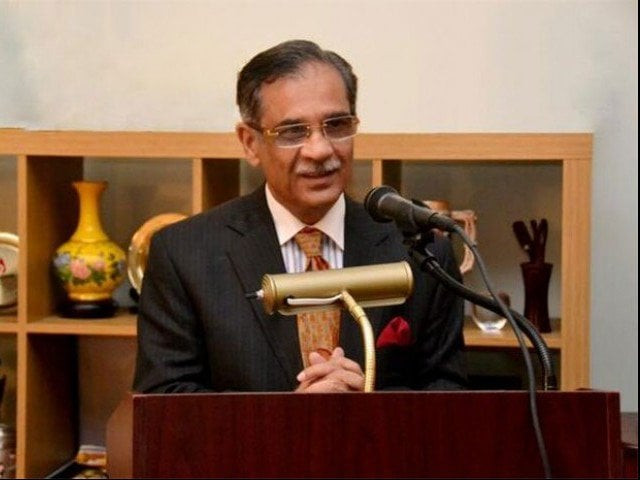Legislative reforms to free up court time: CJP
Reveals that govt plans to end option of second appeal in CCP cases

PHOTO: EXPRESS/FILE
The CJP made these suggestions on Wednesday while heading a three-judge bench hearing a constitutional plea seeking judicial reforms in the country. During the hearing, the CJP told about his meeting with Law Minister Dr Farogh Nasim on judicial reforms.
He revealed that the government is planning to end the option of second appeal in the code of civil procedure (CCP) cases. Explaining his first proposal, the CJP questioned why it is mandatory that the civil court issue succession certificates and why the National Database Registration Authority (NADRA) is not being authorised to do the same.
At present, any person claiming inheritance in Pakistan has to file a Suit for Declaration under S-42 of Specific Relief Act, 1877 for claiming inherited land and a Suit for Succession under Succession Act, 1925 for claiming inherited assets other than land such as bank accounts, gold and prize bonds. Suits of this nature are filed in their thousands every year and unnecessarily take up the civil courts' time.
The legal experts believe that the job of determining heirs and distributing inheritance amongst them in accordance with law is, in essence, an executive function with which the judiciary has been unnecessarily burdened.
CCI is subservient to parliament, says SC detailed verdict
It should, through appropriate legislation, be delegated to government bodies. Only disputed inheritance cases should be brought for resolution to the judiciary.
The second proposal floated by the CJP in court related to improving the mechanisms for registration of contracts related to sale and lease of land. The provincial registration authorities register such contracts under the Registration Act, 1908. However, the registration is done in a most obscure and haphazard manner and the record is not digitalised.
The civil courts spend a lot of time and effort simply obtaining evidence for determining the veracity of contracts. If a computerised database for registration of land-related contracts similar to NADRA's CNIC database were set up and made accessible to civil courts, a lot of court time and effort could be saved. This would free up courts’ time and allow them to focus on dispensing speedy justice.
The CJP's third proposal related to the law of pre-emption – a law which enables neighbours to dispute contracts for sale of rural land on flimsy basis. This law not only spawns a steady stream of meritless litigation but also creates doubts in existing property rights. If this law could be repealed or amended, a lot of courts' time could be freed up for more deserving cases.
Bill referred to legislative committee
During the hearing, the CJP lamented that litigants are worried due to delay in justice.
At the end of the hearing, the bench directed the law minister to arrange a meeting with the petitioners and amicus curiae for developing a shared vision for civil justice reform within the next two weeks. The CJP indicated that he himself would preside over the meeting, if necessary.
On the last date of hearing, the bench had appointed Salahuddin Ahmad, ASC and Zafar Kalanauri as amicus curiae in the case. Ahmad, who is a former vice chairman of the Sindh Bar Council, said he has filed his brief which endorses the six key reforms highlighted by the petitioners.
Ahmad has added a few suggestions of his own and suggested that the reform process should be steered by a sitting SC judge who might be made ex-officio member of the LJCP for the purpose.


















COMMENTS
Comments are moderated and generally will be posted if they are on-topic and not abusive.
For more information, please see our Comments FAQ